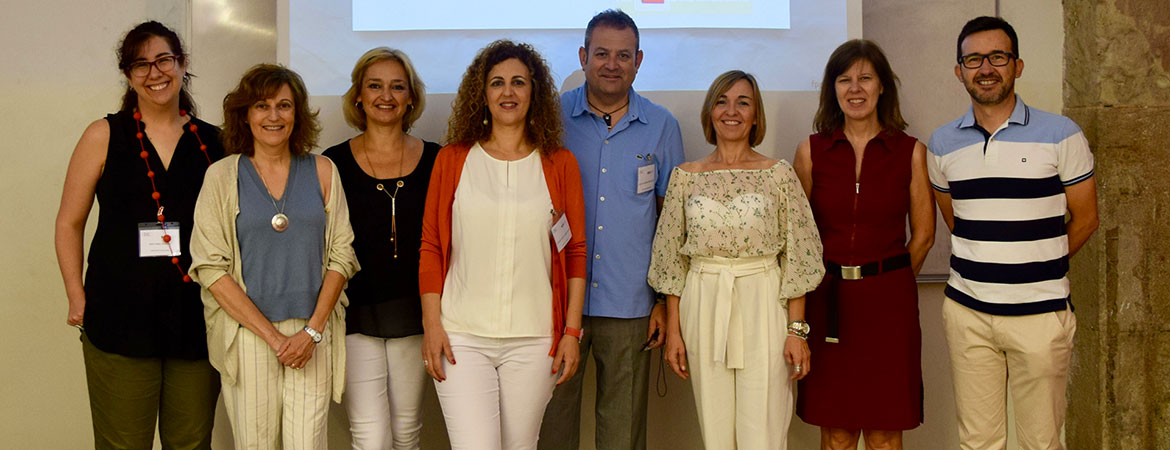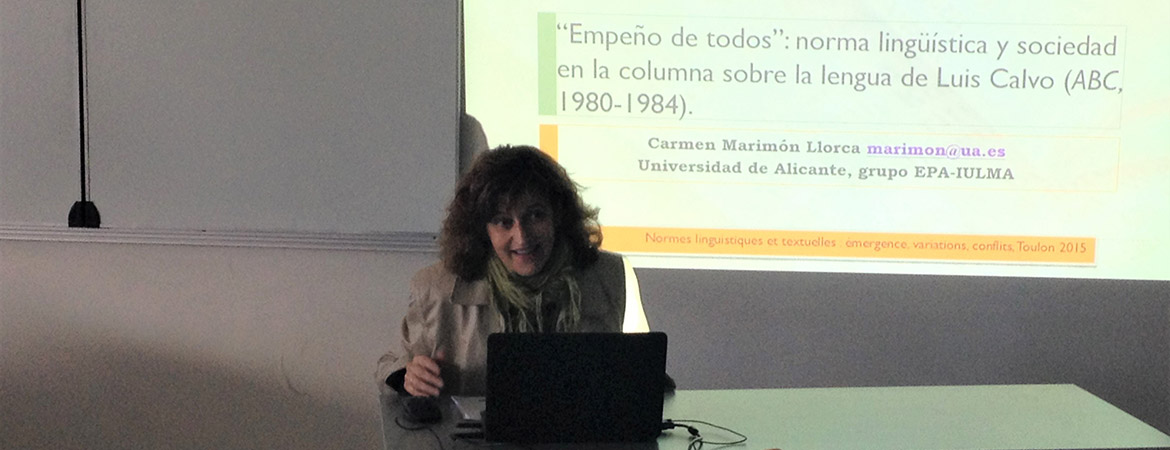






Contacta con nosotros 965 90 9389 | marimon@ua.es
El presente Proyecto pretende analizar y definir un género propio del discurso metalingüístico hasta ahora no abordado de forma global en España que denominamos "Columnas sobre la lengua" (CSL). Se trata de textos publicados con regularidad en la prensa periódica, firmados por un mismo autor y en los que se tratan de manera divulgativa cuestiones relacionadas con los usos de la lengua. El objetivo es abordar la caracterización del género tanto desde la perspectiva de su construcción discursiva, como por lo que se refiere a su contenido normativo, pedagógico y divulgador.
En el plano discursivo se ha tomado en consideración la múltiple naturaleza de este tipo de textos. Así, como discurso periodístico de opinión, se priorizan aspectos constructivos de naturaleza pragmática que pueden resultar definitorios frente a otras manifestaciones del periodismo de opinión, como la identidad de los sujetos hablantes, la polifonía enunciativa, la cortesía y los rasgos de oralización, entre otros. Desde la perspectiva estrictamente metalingüística, las CSL son manifestaciones del decir del lenguaje y, en este sentido, suponen siempre un juicio sobre el lenguaje desde el lenguaje mismo. El estudio de los actos de habla, la modalidad y la tipología de los juicios de responsabilidad marcarán la diferencia con otros tipos de discurso metalingüístico. La naturaleza de discurso epistémico y el posicionamiento ideológico sobre el uso de la lengua que suponen, llevan a caracterizar las CSL desde las perspectivas del saber y del poder. En este sentido se han utilizado para el análisis herramientas propias del ACD como los modos de enunciación del tema, el eje nostros-ellos en relación con el buen o mal uso de la lengua, la retiración de estructuras formales y sintácticas, las nominalizaciones o la secuencia tema-comentario, entre otros. Finalmente, las CSL son también textos argumentativos por lo que se caracterizan también por su naturaleza retórica en términos de estrategias argumentativas, sintaxis y semántica valorativa, uso de metáforas y de otros mecanismos retóricos.
En el plano del contenido, el objetivo es indagar en la naturaleza de los juicios normativos que se proponen en las CSL -purismo, estandarización, neologísmo...- situar su estudio en el marco más amplio de la investigación sobre ideologías lingüísticas -qué imaginario sobre la lengua se crea- y establecer así una relación entre las CSL, la norma lingüística y la norma social. Las CSL pueden considerarse manifestaciones de lo que se denominan ideologías lingüísticas, ya que en ellas se cuestiona, se valora, se justifica o estigmatizan modos de expresión –usos de la lengua- que, finalmente siempre suponen algún tipo de ruptura de la norma lingüística y social dominante. El hecho de estar unidas a un espacio-tiempo concreto les proporciona un enorme valor como testimonios vivos de la evolución de la lengua-en-sociedad.
Desde una visión lingüístico-discursiva, que toma en consideración la relación entre el uso de la lengua y su contexto social, desde METAPRES hemos querido mostrar que las CSL pueden ser un instrumento valioso para entender (a) cómo cambia la lengua (b) cómo se construye y cambia el discurso sobre la lengua, y poder (c) explotar su potencial pedagógico.
El corpus está formado por columnas sobre la lengua publicadas en español en la prensa periódica nacional española en papel desde los años 40 hasta la actualidad lo que hará posible una perspectiva histórica sobre los análisis.
This project aims to analyze and define a genre of metalinguistic discourse so far not addressed comprehensively in Spain call "Columns on language" (CSL). These are texts published regularly in periodical press, signed by the same author and wherein issues related to the uses of language from an informational perspective are discussed. The goal is to address the characterization of the genre from the perspective of its discursive construction, for what concerns its normative, educational and informational content.
In discursive level the multiple nature of this type of texts will be considered. As journalistic discourse of opinion it will be prioritize the study of the constructive aspects of pragmatic nature that may be definitional compared to other manifestations of opinion journalism, as the identity of the speaking subjects, the enunciative polyphony and features of oralization, among others. From a strictly meta-linguistic perspective, the CSL are manifestations of “speech about language”, in this sense, always involve a judgment about the language from the language itself. The study of speech acts, the form and type of proceedings to determine responsibility make a difference with other types of metalinguistic discourse. The nature of epistemic discourse and the ideological position on the use of language which represent, lead to characterize the CSL from the perspectives of knowledge and power. In this regard tools of the ACD will be used for the analysis as modes of enunciation of the subject, the axis us-them in connection with the use or misuse of language, the reiteration of formal and syntactic structures, nominalizations or sequence theme -comment, among others. Finally, the CSL are also argumentative texts which can also be characterized in his rhetorical nature in terms of argumentative strategies, valuation syntax and semantics, use of metaphors and other rhetorical devices.
In terms of content, the aim is to investigate the nature of the normative judgments that are proposed in the CSL -purism, standardization, neologism-, place its study in the wider context of research on language ideologies -imaginaries on language - and establish a relationship between the CSL, the linguistic and the social norm. In this sense, the CSL can be considered manifestations of what are called linguistic ideologies, because in them is questioned, valued, justified or stigmatize modes -uses of language- that finally always involve some sort of break from the linguistic and social dominant norm. Being linked to a particular space-time provides an enormous value as living testimonies of the evolution of language-in-society.
From a linguistic-discursive vision that takes into consideration the relationship between language use and social context, it`ll attempt to show that the CSL can be a valuable tool to understand (a) how the language change (b ) how is constructed and changed the discourse on language, and in order to (c) take advantage of its pedagogical potential.
The corpus will consist of columns on the Spanish language published in the national daily press on paper from the 40s until today making it possible to establish a historical perspective on the analysis.